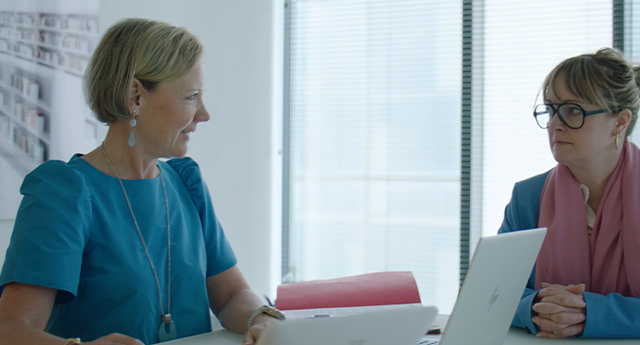Proximus NXT, ICT partner in the digitalization drive of notaries
Notaries are in the top three most trusted professions alongside doctors and architects. That is not possible without reliable IT tools and a cooperation based on trust. Humanware on top of software. The recipe of Fednot, 1,600 notaries, and Proximus NXT.
Digital powers of attorney, video conferencing, applications for contacts with public authorities: these are ICT solutions that notaries have been using for about a decade thanks to the trust between Fednot, with CEO Jan Sap, Chair Katrin Roggeman and ICT Program Manager Vincent Arijs, and the Proximus NXT team of Dirk Janssens, Sales Account Executive, and Jan De Laet, Success Manager.
Notaries are relevant and reliable
Jan Sap: "There are some 1,600 notaries in Belgium who in turn have many employees and around 1,200 offices. As an umbrella organization, Fednot supports notaries in many areas. Our ambition is to make the notarial profession as relevant as possible so that clients 'want' to call the notary at key moments, and not just because they have to. This requires optimal operation with the right ICT tools in an evolving digital context."
Katrin: "We don't just need the tools but also the support around them. Our notaries are not ICT specialists. For some of our members, digitalization is going a bit too fast while for others it cannot go fast enough."

National coverage and ICT expertise
Vincent: "Belgians rely on notaries, so the technology that the notary in turn relies on has to be very secure and reliable. We picked Proximus NXT several years ago. We wanted a partner with national coverage, although there were other strengths too. One was the wide end-to-end spectrum that Proximus NXT runs, which has evolved further throughout our collaboration."
"While it used to be only about connectivity, our ICT scope now has expanded to include video conferencing, security, data, cloud, service, and support. One example is our central e-notary portal which has about 150 applications that are mission-critical for notaries. We also create the technical framework with Fednot in terms of regulations, like privacy laws for example."
Secured Notarial Network
Dirk: "Jan and Vincent made it very clear that security is crucial for notaries. Security is obviously something you have to keep developing, it's not something you just install and leave."
Vincent: "So one of the core elements is the Secured Notarial Network (SNN). It is a private network, which spans the entire country and connects every notary to the relevant government departments. That data is completely separated from the regular internet. This is a requirement for complying with the precise legal framework around the data that we exchange."
Ecosystem
Dirk: "We set up an ecosystem with Proximus NXT, fully tailored to Fednot and notaries in Belgium. With the SNN, the cloud portal 'Notary in the Cloud' and our dedicated ICT helpdesk, we address the lack of ICT expertise with notaries as well as the strict regulation around their activities. It is thanks to the open and transparent relationship we have with Jan, Vincent, and their colleagues that we can be responsive to their needs."
Katrin: "The digitization of transactions through ICT allows us to focus more on guiding people through that complexity of legislation and society."
Jan De Laet: "Digitalization is a very important part of this story, but it is human contact that makes all the difference in our collaboration. We work here not only with Fednot, our direct client, but also with the notaries as well as other ICT partners who sometimes service local notaries. The basis for our NPS (Net Promoter Score) is that everyone in this ecosystem is satisfied."
Our cooperation runs on mutual trust. That's the humanware on top of the software.
Vincent Arijs is ICT Program Manager at Fednot
Software and humanware
Vincent: "Our cooperation runs on a healthy foundation of mutual trust. I see that as the humanware on top of the software. That means providing answers together to questions from our notaries, anticipating new technological evolutions together, just like weighing up different ICT architecture options together and deciding which is the right choice. It's about constantly evaluating, maintaining service levels, and setting priorities together. And this simultaneously on an operational and strategic level."
Jan Sap: "We once had problems with a cable cut. I spent all evening on the phone with Dirk to sort it out. That shows how quickly we can work together."
We work together with Fednot, the notaries, as well as other ICT partners. The basis for our Net Promoter Score is that everyone in this ecosystem is satisfied.
Jan De Laet, Success Manager at Proximus NXT

Dirk: "That is why we stay in constant contact. Jan and Vincent know they can call me anytime, even late at night. We also have a continuous exchange with the users in the many offices. We have set up a separate ICT helpdesk for Fednot at Proximus NXT for this purpose so that notary offices can contact us for their queries."
Vincent: "We have often faced extraordinary challenges. Remember those interruptions to our operation during the floods in the Vesdre valley? It is when things continue to function professionally and solution-oriented under circumstances like that, that you know you have each other's backs."
Fednot's company profile
Fednot supports notary offices with legal advice, office management, IT solutions, training, and information for the general public.
Jan Sap is CEO at Fednot.
Katrin Roggeman, Chair at Fednot.
Vincent Arijs is ICT Program Manager at Fednot.
Dirk Janssens is Sales Account Executive at Proximus NXT.
Jan De Laet, Success Manager at Proximus NXT.




